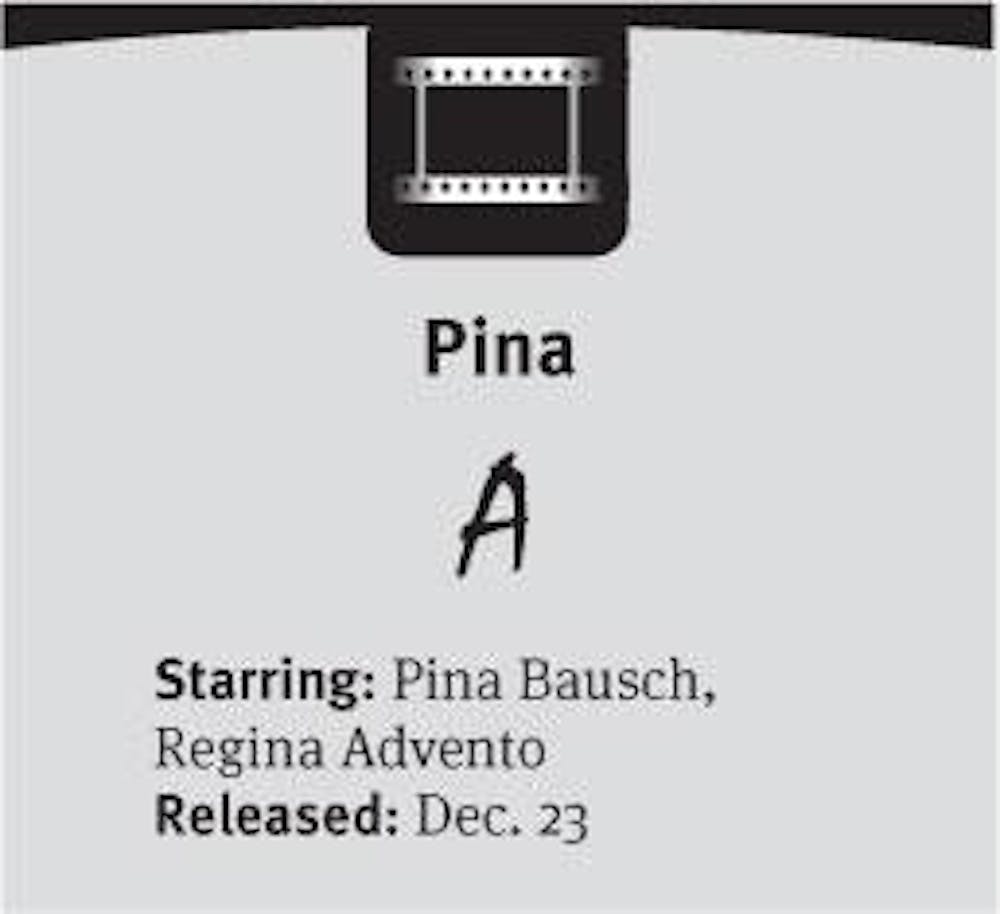'Pina' exudes passion

"Dance, dance, otherwise we are lost," Pina Bausch said. The German dancer, teacher and ballet director was one of the most influential leaders in modern dance since the 1970s. Pina, under the brilliant direction of Wim Wenders (Palermo Shooting), pays tribute to Bausch by showcasing some performances of her students.
The film, nominated for Best Documentary Feature at the 84th Annual Academy Awards, includes personal commentary from the dancers about what they had learned from Bausch. The director chooses a narration technique that overlays the omnipresent dancers' monologues onto visual performances of their dances. Wenders' technique forces the audience to think about each dancer's message through his or her dance. In the regular movie world, we tend to distinguish characters by their names, physical features and dialect. Yet in Pina, we are able to distinguish each dancer through the distinct themes portrayed in each performance. The lack of dialogue leaves the audience nothing to focus on but the harmony of each dancer's movement and expression.
Each dance, rich in various themes —loneliness, love, pain, joy, societal pressures and fears — is a depiction of human nature. Yet Pina is more than a collection of rich dances. They say dances are poetry in motion, but Wenders' use of 3-D takes this to a whole different level. The audience becomes a part of the poetry. The director remarkably captures each layer and element from the dance, using transitions, zoom-ins, lighting and layers to magnify even the slightest of movements, from an uplift in the eyebrow to a twitch in the lip. Each captured expression reflects the tale shared by the dancer.
Wenders also exploits a number of motley settings in which the dances are performed. From swimming pools to streets, deserts to hills, the outdoor performances maintain the audience's attention throughout the whole film. Bausch incorporated the various elements from these settings, such as the wind, water, grass and soil, to serve as the dancers' obstacles.
This cinematographically magnificent film is a quality work of art. However, if you plan on getting a couple of laughs or a dramatic twist with some blood and gore, Pina might not be your piece of cake. There's no plot, drama, character building or conflict, at least not in the literal sense, but if you're up for a night of reflection and marvel, Pina is definitely worth your while. There are some repetitive dance routines that are befuddling, even annoying at times, but in the end they all manage to evoke a response, lending a true appreciation of the human body as a ?work of art.
More from The Rice Thresher

Andrew Thomas Huang puts visuals and identity to song
Houston is welcoming the Grammy-nominated figure behind the music videos of Björk and FKA twigs on June 27.

Live it up this summer with these Houston shows
Staying in Houston this summer and wondering how to make the most of your time? Fortunately, you're in luck, there's no shortage of amazing shows and performances happening around the city. From live music to ballet and everything in between, here are some events coming up this month and next!

Review: 'Adults' couldn’t have matured better
Sitcoms are back, and they’re actually funny. FX’s “Adults” is an original comedy following a friend group navigating New York and what it means to be an “actual adult.” From ever-mounting medical bills to chaotic dinner parties, the group attempts to tackle this new stage of life together, only to be met with varying levels of success.

Please note All comments are eligible for publication by The Rice Thresher.